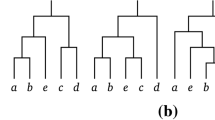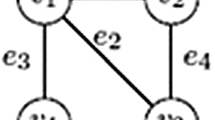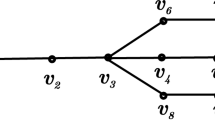Abstract
Let \({\mathbb{N}}\) denote the set of all nonnegative integers. Let \({k \ge 3}\) be an integer and \({A_{0} = \{a_{1}, \dots, a_{t}\} (a_{1} < \cdots < a_{t})}\) be a nonnegative set which does not contain an arithmetic progression of length k. We denote \({A = \{a_{1}, a_{2}, \ldots{}\}}\) defined by the following greedy algorithm: if \({l \ge t}\) and \({a_{1}, \dots{}, a_{l}}\) have already been defined, then \({a_{l+1}}\) is the smallest integer \({a > a_{l}}\) such that \({\{a_{1}, \dots, a_{l}\} \cup \{a\}}\) also does not contain a k-term arithmetic progression. This sequence A is called the Stanley sequence of order k generated by A0. We prove some results about various generalizations of the Stanley sequence.
Similar content being viewed by others
References
N. Alon and J. H. Spencer, The Probabilistic Method, 4th ed., Wiley (2016).
Behrend F. A.: On sets of integers which contain no three terms in arithmetical progression. Proc. Nat. Acad. Sci. USA. 32, 331–332 (1946)
Y.-G. Chen, On AP 3-covering sequences, arxiv.org/abs/1711.00172.
Dai L.-X., Chen Y.-G.: On the counting function of Stanley sequences. Publ. Math. Debrecen. 82, 91–95 (2013)
Erdős P., Lev V., Rauzy G., Sándor C., Sárközy A.: Greedy algorithm, arithmetic progressions, subset sums and divisibility. Discrete Math. 200, 119–135 (1999)
Gerver J., Ramsey L. T.: Sets of integers with no long arithmetic progressions generated by the greedy algorithm. Math. Comp. 33, 1353–1359 (1979)
H. Halberstam and K. F. Roth, Sequences, Springer-Verlag (New York, 1983).
Moy R. A.: On the growth of the counting function of Stanley sequences. Discrete Math. 311, 560–562 (2011)
A. M. Odlyzko and R. P. Stanley, Some curious sequences constructed with the greedy algorithm, Bell Laboratories internal memorandum (1978).
Roth K. F.: On certain sets of integers. J. London Math. Soc. 28, 104–109 (1953)
Author information
Authors and Affiliations
Corresponding author
Additional information
S. Z. Kiss: The first author was supported by the National Research, Development and Innovation Office NKFIH Grant No. K115288.
Cs. Sándor: The second author was supported by the OTKA Grant No. K109789. This paper was supported by the János Bolyai Research Scholarship of the Hungarian Academy of Sciences.
Q.-H. Yang: The third author was supported by the National Natural Science Foundation for Youth of China, Grant No. 11501299, the Natural Science Foundation of Jiangsu Province, Grant Nos. BK20150889, 15KJB110014 and the Startup Foundation for Introducing Talent of NUIST, Grant No. 2014r029.
Rights and permissions
About this article
Cite this article
Kiss, S.Z., Sándor, C. & Yang, QH. On generalized Stanley sequences. Acta Math. Hungar. 154, 501–510 (2018). https://doi.org/10.1007/s10474-018-0791-1
Received:
Revised:
Accepted:
Published:
Issue Date:
DOI: https://doi.org/10.1007/s10474-018-0791-1




